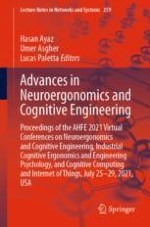2021 | OriginalPaper | Buchkapitel
Playful Screening of Executive Functions Using Augmented Reality and Gaze Based Assessment
verfasst von : Martin Pszeida, Amir Dini, Sandra Schüssler, Claudia Voithofer, Jean-Philippe Andreu, Philipp Hafner, Lucas Paletta
Erschienen in: Advances in Neuroergonomics and Cognitive Engineering
Aktivieren Sie unsere intelligente Suche, um passende Fachinhalte oder Patente zu finden.
Wählen Sie Textabschnitte aus um mit Künstlicher Intelligenz passenden Patente zu finden. powered by
Markieren Sie Textabschnitte, um KI-gestützt weitere passende Inhalte zu finden. powered by
